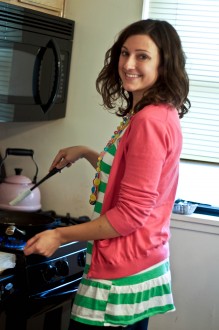This week’s My Portion is going to be a little different from the others. Why? Because in this week’s post, I am challenging all of you to join me in a little experiment!
This morning I came across this article from MSNBC.com entitled “Food for thought: Thinking makes us pig out.” The article discusses a study published in the journal Psychosomatic Medicine in which “researchers split 14 university student volunteers into three groups for a 45-minute session of either relaxing in a sitting position, reading and summarizing a text, or completing a series of memory, attention, and vigilance tests on the computer.”
The student volunteers who were involved with the “thinking” group burned only three more calories than those students in the “relaxed” group.
After the experiment was over, both groups were allowed to eat as much as they wanted. According to the article, students who had worked on the computer ate 253 more calories than those in the resting group, and those who had read and summarized text consumed 203 more calories than the resting group.
The article goes on to discuss specific scientific reasoning behind these results.
Bottom line: Thinking tasks make us hungrier.
And since we’re more likely to be sitting down or inactive while completing said thinking tasks, we aren’t burning any extra calories to make up for this extra hunger.
Whether you’re studying for an exam or working on a project on the job, we all engage in a number of intellectual tasks every day. My question for you, then, is do these tasks make you extra hungry?
Personally – and I’ve mentioned this before – I know I tend to feel hungrier when I am sitting around doing nothing and less hungry when I am up and active all day long. But what I don’t know is whether or not this degree of hunger has to do with the level of thinking going into these tasks or the level of actual physical activity.
So here’s where the challenge comes in!!
The “Think” Before You Eat Challenge
What: A challenge that forces me – and you, if you’re interested! – to take a look at the activity – physical, mental and resting – that I am engaged in before each meal or snack and to judge whether I’m hungrier after a physical, mental or resting task.
Why: To see how my results compare to the scientific study, get a hold on whether my hunger is real hunger or “thinking” hunger 😉 and determine whether there is actually a difference between the two.
How: For one week, I will take an extra moment before eating each meal or snack to jot down what I was doing in the hours leading up to said meal or snack – whether it was a physical activity, mental activity or a resting state – and what my hunger level is on a scale of 1 to 10 – 1 being ravenous and 10 being extremely full. I will also gauge my hunger level once more roughly 1/2 hour after I finish the meal or snack to see whether or not the type of activity I was doing has an impact on how the meal or snack keeps me full.
I will post the results at the beginning of next week’s My Portion post. Anyone else who wants to join in on this challenge – please do!
Let me know your thoughts on this issue in the comment section, and if you have any suggestions, add those in there as well  I’m pretty pumped about this one because although I feel that I have a general grasp on what the results might be, I think there is definitely room for some surprises!
I’m pretty pumped about this one because although I feel that I have a general grasp on what the results might be, I think there is definitely room for some surprises!








This is so interesting…and you know I believe that it is true. It is when I’m doing nothing, or just simply engaged in something simple like folding clothes, cleaning my apartment, watching a good movie stretched out on the couch – it is only then that I don’t think or care about food. Otherwise – if I’m working, typing, reading, writing even, walking – it’s there at the back of my mind. “Take a break”, get a snack, do some baking…binge…God it’s horrible.
Are you still doing this experiment? I think that even with “mindless tasks” , one would still eat. But what changes is that the FEELINGS go away – you don’t associate guilt over what your eating or anxiety or even extreme happiness. And without that – you simply stop, finish it, put it way and then carry on.